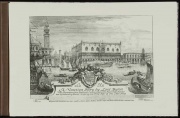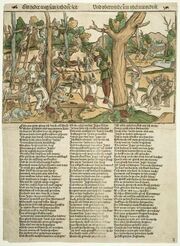Difference between revisions of "Letterpress ink"
Jump to navigation
Jump to search
(username removed) |
|||
| (2 intermediate revisions by 2 users not shown) | |||
| Line 1: | Line 1: | ||
| − | [[File:2001.833-SC28571.jpg|thumb|]] | + | [[File:2001.833-SC28571.jpg|thumb|Letterpress illustrations<br>MFA# 2001.833]] |
== Description == | == Description == | ||
| − | + | [[File:42.43-SC28808.jpg|thumb|Letterpress and woodcut<br>MFA# 42.43]] | |
A thick, pasty ink used on letterpress rollers. Letterpress inks produce a slightly raised image that typically dries by oxidation. | A thick, pasty ink used on letterpress rollers. Letterpress inks produce a slightly raised image that typically dries by oxidation. | ||
| Line 8: | Line 8: | ||
half-tone ink | half-tone ink | ||
| − | == | + | ==Resources and Citations== |
| − | |||
| − | |||
| − | |||
| − | |||
| − | |||
| − | |||
| − | |||
* Boise Cascade Paper Group, ''The Paper Handbook'', Boise Cascade, Portland OR, 1989 | * Boise Cascade Paper Group, ''The Paper Handbook'', Boise Cascade, Portland OR, 1989 | ||
Latest revision as of 12:35, 7 October 2022
Description
A thick, pasty ink used on letterpress rollers. Letterpress inks produce a slightly raised image that typically dries by oxidation.
Synonyms and Related Terms
half-tone ink
Resources and Citations
- Boise Cascade Paper Group, The Paper Handbook, Boise Cascade, Portland OR, 1989
- Luis Nadeau, Encyclopedia of Printing, Photographic, and Photomechanical Processes, Atelier, New Brunswick, 1997

